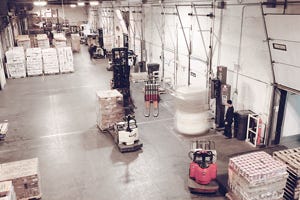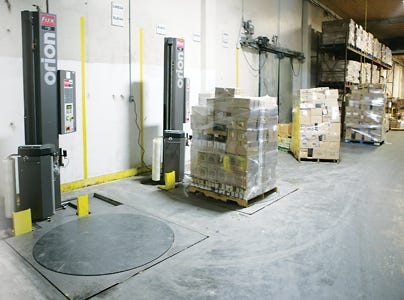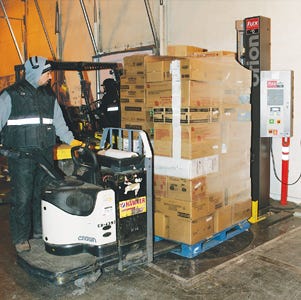Pallet Loads get a Wrap
January 30, 2014
|
Picking and palletizing 16 million cases/yr of chilled, frozen and sub-zero foods for retailers, VersaCold added 12 stretch wrappers that have improved traffic flow. |
VersaCold/Atlas, Modesto, CA, operates more than 120 modern, temperature-controlled warehouses across Canada and in the U.S., with a combined storage capacity of close to 502 million cubic feet. The busy Modesto VersaCold facility comprises 10,621,579 cu ft of freezer and refrigerated storage space, served by a 41-truck shipping platform and a 29-car private railroad siding. The facility's five buildings include 53 active dock doors through which pallets of product are arriving and departing 24 hours a day.
The facility receives, stores and distributes refrigerated foods and frozen foods and “sub-zero” products like ice cream that require the lowest temperatures. Some of the facility's throughput is distributed in the same configuration in which it arrived,
as stretch-wrapped full pallets are stored and then moved
to trucks for distribution.
However, a significant portion of what passes through this busy warehouse operation involves picking product and building pallet loads to meet the needs of specific retailers. VersaCold reports picking and palletizing 16 million cases per year.
Stretch-wrapping those pallet loads for shipment at the same time that pre-wrapped full pallets move to waiting trucks on the same “busy street” has always been a challenge. Recently, VersaCold purchased 12 Packaging Flex LPD (Low Profile Deluxe) stretch wrappers from Orion Packaging (www.orionpackaging.com) that have improved traffic flow while at the same time improving pallet stability and appearance and significantly reducing film cost.
“In addition to the fact that they pay for themselves, the key to what makes these machines work for us is their small footprint,” says Modesto facility general manager Robert Bascom. “Placed against a wall and not requiring lots of floorspace, they don't interfere at all with product movement,” he says.
Outgrowing hand wrapping
In the 1990s, VersaCold Modesto installed four Orion stretch wrappers to wrap the pallet loads it built for customers. As the facility's operation continued to expand, it outgrew the capacity of these wrappers, which were supplemented with hand-held stretch film applicators.
|
Twelve new pallet wrappers were installed at Mosesto in February 2008. Each can handle a 5,000-lb load at speeds of 15 rpm. |
“Adding hand wrappers was the result of both our growing volume of throughput and the configuration of our work areas,” Bascom points out. “Those large turntable wrappers did the job they were purchased for, but waiting lines would build up because the volume of pallets coming out of our warehouse was so large,” he recalls. The automatic wrappers were also installed in the area where the pallets were being moved to the truck dock. “The flow of pallets and the waiting lines created a bottleneck in the traffic pattern that was more a function of the plant layout than the wrappers' capability,” Bascom relates.
Employees were able to hand wrap loads as quickly as a machine could, but VersaCold found that the fatigue factor involved with continuous hand wrapping, as well as occasional back injuries led to slowdowns. More important, manual wrapping produced less secure pallets and used more film.
“With automated wrapping, customers receive a consistent, secure pallet,” Bascom says. “The chance of items falling over or collapsing is essentially gone.”
Eliminating the bottleneck
A significant advantage of automatic stretch wrapping is that it significantly stretches the film as it is applied. Orion Packaging pre-stretch automated wrapping equipment stretches the film as much as 260 percent as it wraps, and in a busy warehouse such as VersaCold's Modesto operation, the film savings alone can quickly pay off the investment.
“That 260-percent stretch is standard on the wrappers,” says Bascom. “We don't have to adjust anything to get that savings.”
In the past, with the increasing flow of pallets and the number of people VersaCold had ticketing items, pulling cases and wrapping pallets, there was no way every pallet could be wrapped with the existing machines,” says Rob Shoemaker, director of Orion Packaging's Western Region. “They decided to place a wrapper by every dock door, or between adjacent doors where they're convenient.”
So VersaCold located its 12 new Orion automated stretch wrappers, installed in February 2008, closer to the sidewalls rather than in the middle of traffic areas. It also removed part of the dock floor and created pits that placed the wrappers' turntables level with the dock floor, to facilitate moving loads on and off the turntables.
“The new wrappers do not interfere with the movement of pallets to waiting trucks,” says Bascom. “In the past, a bottleneck that interfered with traffic would cause workers to bypass the wrapper and manually wrap. Savings in film were lost, and savings we got from the automatic wrappers were eaten up by labor costs.”
During the equipment installation, warehouse operations continued. VersaCold simply roped off areas one at a time, while the rest of the facility kept the pallet loads moving.
Stretch-wrapper operations
“The machines themselves are very easy to use—a pushbutton operation,” says Bascom. “Orion provided training, but it was primarily focused on safety training in how to place a pallet and wrap it.”
The LPD stretch wrapper can handle a maximum load of 5,000 lb at speeds of 15 rpm, which results in a 65-sec wrap for a standard load and up to 90 sec for a tall load.
The LPD has an infrared sensor that automatically detects the height of the load being wrapped as it moves up and down during the wrapping process.
VersaCold also chose an option that gave it the tallest wrapping arm, which allows it to wrap the tallest pallet load it might encounter.
The wrapper's 63-in.-dia turntable can accommodate loads up to 55x55 in. The loads are delivered by forklift to VersaCold, but are equally accessible with a pallet jack or an electric “walkie.”
Film savings
|
The new wrappers fit in well with the Modesto operation and prevent traffic bottlenecks of the past. They’re also easy to use. |
VersaCold leases its wrappers, primarily so that it has the option to replace them with new equipment every five years. Even including leasing costs, the company realizes substantial savings over earlier film costs. It also chose an option offered by Orion that lets it use a wide, 30-in. film wrap size rather than the standard 20-in. width, which means fewer revolutions for the wrapper, saving even more film.
One tool that convinced Bascom to make the move to the pallet wrappers was a cost analysis presented by Orion that showed in hard numbers what the savings would be.
“In the past, we were spending $145,000 annually on hand wrap film alone, plus what we spent on machine wrap film,” reports Bascom. “Today, our annual machine wrap film costs are going to be $65,000 to $70,000. Even factoring in the annual lease cost of $37,000 for the machinery, we are still saving about $40,000 on the overall cost of wrapping pallets. That means a twenty-nine-percent cost reduction.”
Customers, Bascom reports, love the result. Pallet loads arrive in stable condition, they have a professional appearance and are easy to handle and unload, he says.
“Our larger customers may have as many as 120 stores in their chains, which could translate into 120 sources of complaints,” he summarizes. “But everybody down the line reports being pleased.”
More information is available: |
Orion Packaging, 800/333-6556. www.orionpackaging.com. |
You May Also Like





